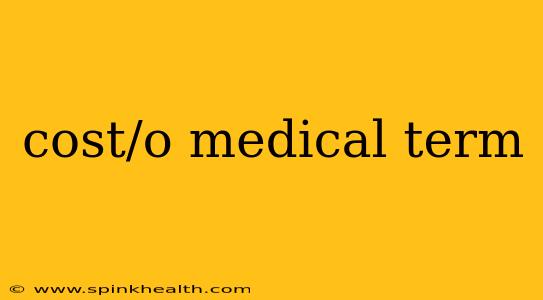Decoding the Medical Term "Cost/o": A Journey into the Rib Cage
Have you ever encountered the medical term "cost/o" and wondered what it means? It might seem cryptic at first glance, but understanding its root unlocks a window into the fascinating world of medical terminology. This isn't just about memorizing a definition; it's about understanding the story behind the word and how it helps doctors and medical professionals communicate effectively.
Let's embark on a journey to uncover the meaning and significance of "cost/o." Imagine yourself in a bustling hospital, where precision in language is paramount. "Cost/o" isn't just an abstract word; it's a crucial piece of the puzzle in diagnosing and treating patients.
What does cost/o mean?
Simply put, "cost/o" is a combining form that means "rib." It's derived from the Greek word "kosta," meaning rib. This seemingly simple term becomes a powerful building block when combined with other medical terms, creating words that precisely describe specific anatomical locations or conditions related to the ribs.
Frequently Asked Questions about Cost/o
Now, let's address some common questions people have about this intriguing medical term. These are often the questions you'll find in the "People Also Ask" section of search engine results.
1. What are some medical terms that use "cost/o"?
The beauty of "cost/o" lies in its versatility. It serves as a foundation for a range of medical terms, creating precise and unambiguous descriptions. For instance:
-
Costochondritis: This term combines "cost/o" (rib) and "chondr/o" (cartilage) with "-itis" (inflammation). Therefore, costochondritis refers to the inflammation of the cartilage connecting the ribs to the breastbone (sternum). It's a condition causing chest pain, often felt in the front of the chest.
-
Intercostal: This term uses "inter-" (between) and "cost/o" (rib), describing structures or processes located between the ribs. For example, intercostal muscles are located between the ribs and play a vital role in breathing. Intercostal neuralgia refers to pain along the pathway of the intercostal nerves.
-
Costal Margin: This refers to the lower edge of the rib cage, where the ribs meet the cartilage connecting them to the sternum. It's a clinically significant landmark for various examinations and procedures.
2. How is "cost/o" used in medical diagnoses?
"Cost/o" helps doctors precisely pinpoint the location of injuries or conditions. For example, a patient presenting with pain near the ribs could have several underlying issues. Using terms like costochondritis or a description of pain in the costal margin helps narrow down potential diagnoses. The precision of "cost/o" is crucial for effective communication among medical professionals, ensuring everyone understands the specific area of concern.
3. Are there any other related medical prefixes or suffixes?
Yes, many related terms use prefixes and suffixes to describe associated structures and conditions. As we saw with costochondritis, "-itis" (inflammation) is a common suffix. Other prefixes and suffixes might describe location (e.g., "subcostal," meaning below the ribs), the nature of the condition (e.g., "-algia" for pain), or the type of procedure (e.g., "-ectomy" for removal).
4. Why is understanding medical terminology important?
Understanding medical terminology, including terms like "cost/o," empowers patients. It allows for better communication with healthcare providers, leading to more informed decisions and improved health outcomes. It's like having a secret decoder ring for understanding your medical records and discussions with doctors.
In conclusion, the seemingly simple combining form "cost/o" is a vital tool in the language of medicine. It's a testament to the power of precise language in healthcare, enabling clear communication and accurate diagnosis. This journey into the world of medical terminology highlights the importance of understanding the roots of medical words and how they contribute to a more comprehensive understanding of health and illness. Remember, medical terminology isn't just about memorization; it’s about unlocking a deeper understanding of the human body and its complexities.

